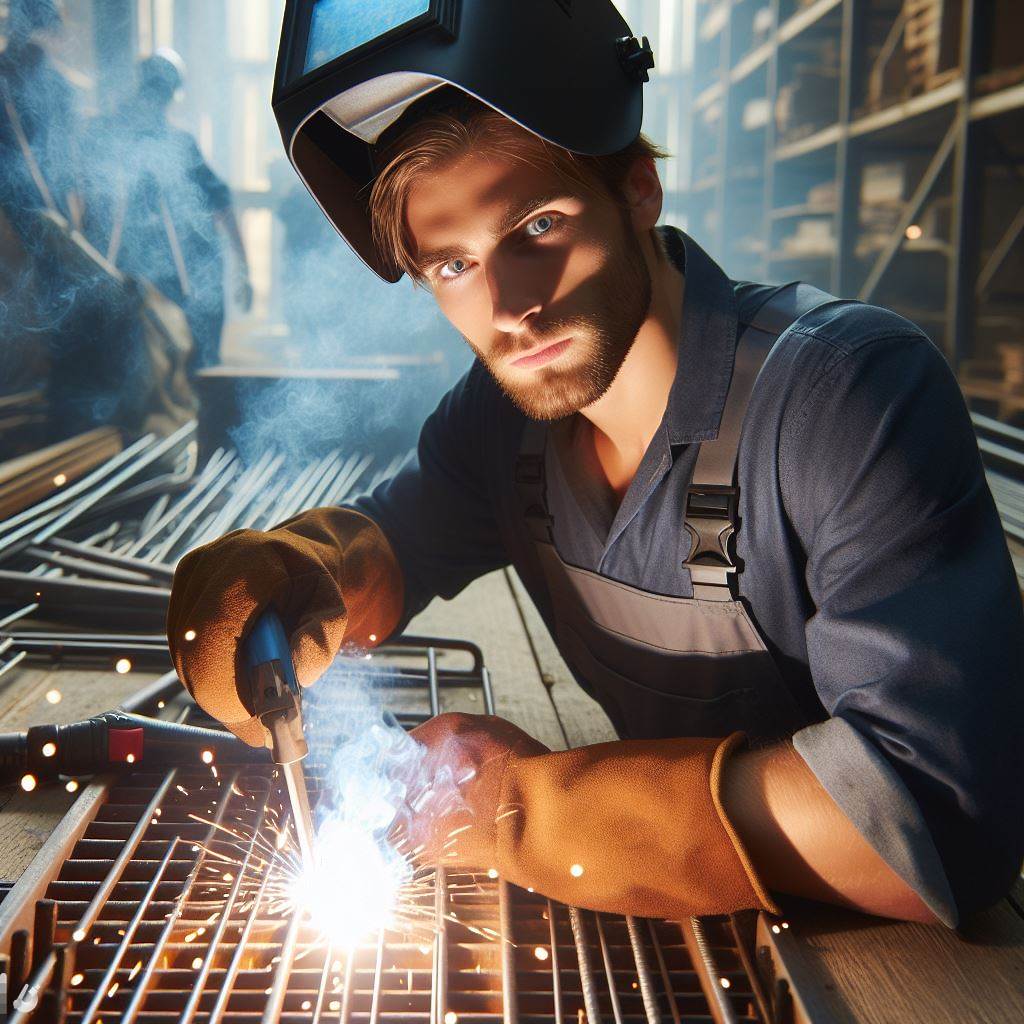Introduction
In Australia, welder certification is a crucial aspect for ensuring quality and safety in welding jobs.
Importance of welder certification in Australia
Welder certification holds significance as it guarantees the skills, knowledge, and competency of welders.
Ensuring that welders are certified ensures that they possess the necessary expertise and proficiency.
It also ensures compliance with industry standards, reducing the risk of accidents, and ensuring quality workmanship.
Blog post purpose
The purpose of this blog post is to provide a comprehensive understanding of welder certification in Australia.
By discussing its importance and purpose, readers can gain insight into the significance of welder certification.
Moreover, this post aims to educate individuals about the requirements and process of welder certification in Australia.
Readers will also learn about the benefits of hiring certified welders and the role of certification in career advancement.
Overall, this blog post aims to emphasize the value and necessity of welder certification in Australia.
Importance of Welder Certification
Welder certification is of utmost importance in Australia as it ensures safety and quality standards. Without proper certification, welders may not possess the necessary skills and knowledge to perform their job effectively.
The significance of welder certification in ensuring safety and quality standards cannot be emphasized enough.
Certified welders have undergone rigorous training and testing to validate their skills and knowledge in various welding techniques and procedures.
This ensures that they are capable of executing their tasks with utmost precision and in compliance with industry standards.
The demand for certified welders in various industries
In various industries such as construction, manufacturing, and automotive, the demand for certified welders is high. Employers seek certified welders as they are confident in their abilities to deliver high-quality work and adhere to safety protocols.
This demand for certified welders creates ample job opportunities in the market, providing welders with a stable and rewarding career.
Furthermore, welder certification enhances career opportunities and earning potential. Certified welders often gain a competitive edge in the job market as their qualifications add value to their resumes.
They are more likely to be considered for higher-paying positions and promotions within their field. Certification acts as an evidence of their expertise and commitment to excellence, making them stand out from non-certified welders.
How certification enhances career opportunities and earning potential
Certification also opens doors for welders to work on specialized projects that require specific expertise. It allows them to broaden their skill set and explore different areas of welding, which can lead to increased earning potential.
Certified welders can take on challenging assignments that require expertise in niche areas, such as underwater welding or aerospace welding, which often come with higher pay rates.
Moreover, welder certification can provide welders with a sense of pride and accomplishment. It validates their hard work and dedication to their profession, boosting their confidence in their abilities.
This sense of achievement acts as a motivator for welders to continually improve their skills, staying updated with the latest welding techniques and technologies.
Your Personalized Career Strategy
Unlock your potential with tailored career consulting. Get clear, actionable steps designed for your success. Start now!
Get StartedTo obtain welder certification in Australia, individuals need to undergo formal training and pass examinations conducted by recognized certification bodies.
These bodies assess the welder’s theoretical knowledge, practical skills, and adherence to safety regulations. Once certified, welders receive a qualification that is recognized and respected within the industry.
In essence, welder certification is crucial for ensuring safety and quality standards in Australia. It not only enhances career opportunities and earning potential but also provides a sense of pride and accomplishment.
Through certification, welders gain credibility and prove their competence in their profession, making them valuable assets in various industries.
Types of Welder Certifications in Australia
Welding is a highly specialized skill, and in Australia, individuals can obtain various certifications to demonstrate their competence in this field.
These certifications are vital for welders to showcase their abilities and enhance their employment prospects.
Let’s delve into the different types of welder certifications available in Australia, their requirements, and the recognized certifying bodies.
Certificate I in Engineering (Fabrication)
This certification is the starting point for individuals seeking a career in welding. It provides a basic understanding of welding techniques, safety procedures, and the use of welding tools and equipment.
The eligibility criteria for this certification include completion of Year 10 or equivalent.
Certificate II in Engineering – Production Technology
This certification focuses on developing practical welding skills and knowledge required for various industries. It covers topics such as metal fabrication, welding processes, and workplace safety.
To be eligible, individuals must have completed Certificate I in Engineering or its equivalent.
Certificate III in Engineering – Fabrication Trade
This certification is designed for individuals who wish to become qualified welders or fabricators. It provides in-depth training in welding techniques, interpreting technical drawings, and working with various metals.
The eligibility criteria include completing Certificate II in Engineering or having relevant work experience.
Certificate IV in Engineering – Welding Supervision
This certification is suitable for experienced welders who want to advance their career into supervisory or managerial roles. It focuses on developing leadership skills, project management, quality control, and inspection techniques.
To be eligible, individuals must have completed Certificate III in Engineering or have significant work experience in the field.
AS/NZS ISO 9606 Welder Certification
This certification is an internationally recognized standard for welders. It verifies a welder’s competence in specific welding processes, positions, and materials.
The eligibility criteria include passing practical welding tests conducted by approved certifying bodies such as Weld Australia and The Welding Technology Institute of Australia (WTIA).
WTIA Welding Supervisor and Inspector Certification
For individuals aspiring to become welding supervisors or inspectors, this certification is essential. It equips them with the necessary skills to oversee welding operations, assess welding quality, and ensure compliance with industry standards.
To obtain this certification, individuals must meet specific course requirements set by the WTIA.
Weld Australia Certification
Weld Australia, formerly known as the Welding Technology Institute of Australia (WTIA), offers various certifications, including Certified Welder, Senior Welding Inspector, and Welding Supervisor.
These certifications are highly respected in the welding industry and demonstrate an individual’s professionalism and expertise.
Obtaining the right welder certification in Australia can significantly improve an individual’s career prospects in the welding industry.
Whether it’s starting as a beginner welder or aiming for a supervisory role, the certifications available cater to diverse skill levels and aspirations.
With recognized bodies like Weld Australia and the WTIA, welders can showcase their expertise and ensure their skills meet industry standards.
Read: A Day in the Life of an Aussie Plumber
Process of Obtaining Welder Certification
- Enroll in a reputable welding training program accredited by the Welding Technology Institute of Australia (WTIA).
- Complete the required training courses and practical hands-on experience in welding techniques and safety procedures.
- Gain experience through apprenticeship programs or work as a welder under the supervision of a certified professional.
- Prepare and submit the necessary documentation, including proof of completion of training programs and work experience.
- Pass the practical assessment, which involves demonstrating proficiency in various welding techniques.
- Successfully complete the written examination that tests theoretical knowledge in welding principles, safety, and materials.
- Receive your welder certification from the WTIA, which recognizes your competence and expertise in the field.
Necessary Training Programs and Courses
Before pursuing welder certification in Australia, aspiring welders must undergo comprehensive training programs and courses to acquire the required skills and knowledge. These include:
- Basic welding training, covering safety practices, equipment operation, and fundamental welding techniques.
- Advanced welding courses focusing on specific welding processes such as TIG, MIG, and arc welding.
- Welding inspection and quality assurance programs to ensure adherence to industry standards and specifications.
- Training in welding codes and standards, including Australian Welding Standards (AS/NZS).
- Specialized courses on welding in various industries, such as automotive, construction, and manufacturing.
Practical and Theoretical Assessments for Certification
To become a certified welder in Australia, individuals must successfully pass both practical and theoretical assessments:
Stand Out with a Resume That Gets Results
Your career is worth more than a generic template. Let us craft a resume and cover letter that showcase your unique strengths and help you secure that dream job.
Get Hired- Practical assessments evaluate a welder’s ability to perform welding tasks accurately, efficiently, and safely.
- These assessments typically involve demonstrating skills in different welding positions, joint configurations, and material types.
- Theoretical assessments assess a welder’s knowledge and understanding of welding principles, metallurgy, and safety practices.
- Topics covered in the theoretical assessment include welding symbols, welding procedures, welding defects, and material properties.
- Both assessments are designed to ensure welders meet the industry standards and can consistently produce quality welds.
Obtaining welder certification in Australia is a rigorous process that involves comprehensive training and assessments.
By completing accredited training programs, gaining practical experience, and passing both practical and theoretical assessments, welders can demonstrate their competence and expertise in the field.
Achieving certification not only enhances job prospects but also ensures adherence to industry standards and contributes to overall safety in welding operations.
Read: The Future of Plumbing Tech in Australia
Learn More: Mech Engineering: Salaries Across Australia
Benefits of Welder Certification
Obtaining a welder certification in Australia comes with several advantages.
In this blog section, we will discuss the benefits of holding a welder certification, including job security, career progression, and the importance of ongoing professional development.
List of Advantages
- Enhanced Employability: Having a welder certification increases your chances of being hired by reputable welding companies.
- Industry Recognition: Certification demonstrates your skills and knowledge to potential employers and clients.
- Higher Income Potential: Certified welders are often eligible for higher pay rates compared to non-certified welders.
- Expanded Job Opportunities: Many companies, especially in challenging welding sectors, require certified welders.
- Improved Safety: Certification ensures that you possess the necessary skills and knowledge to work safely.
Job Security and Career Progression
Welder certification plays a vital role in ensuring job security and opening doors for career advancement.
- Job Security: By holding a welder certification, you make yourself more valuable to employers. Certified welders are seen as assets due to their specialized skills and industry recognition. During tough economic times, companies often prioritize certified welders when making employment decisions.
- Career Progression: Welder certification is a stepping stone towards career growth. It helps you stand out from the competition and increases the chances of being promoted to higher positions. Certified welders are often considered for supervisory roles or given opportunities to specialize in specific welding techniques.
Importance of Ongoing Professional Development
Certification is not a one-time achievement; it requires ongoing professional development to maintain its validity and reap its benefits.
- Updated Skills and Knowledge: Welding technology and practices continue to evolve. Ongoing professional development ensures that certified welders stay up to date with the latest advancements, techniques, and safety protocols.
- Maintaining Relevance: Continuous learning helps certified welders remain relevant in a competitive job market. Employers value individuals who demonstrate a commitment to improving their skills and knowledge.
- Renewal Requirements: Welder certifications usually have expiration dates. Ongoing professional development ensures you meet the renewal requirements, enabling you to maintain your certification status without interruptions.
- Career Advancement Opportunities: Learning new skills through ongoing professional development can lead to more career opportunities and potential salary increases.
- Networking and Community: Engaging in continuing education provides opportunities to network with other certified welders, industry experts, and potential employers. Building professional connections can enhance career prospects.
In conclusion, the benefits of welder certification in Australia are numerous. It enhances employability, leads to job security and career progression while emphasizing the importance of ongoing professional development.
Obtaining and maintaining a welder certification is a worthwhile investment in your welding career.
Read: Top Plumbing Trends in Australian Engineering

Challenges and Tips for Obtaining Welder Certification
Potential Challenges Faced During the Certification Process:
- Meeting the educational requirements is often a significant challenge for aspiring welders.
- Some individuals struggle with the physical demands of welding, which can hinder their certification journey.
- The cost associated with obtaining certification can be a major obstacle for many people.
- Time management is crucial when balancing work, training, and studying for the certification exams.
- Understanding and following safety protocols can pose challenges during the certification process.
Tips and Advice for Aspiring Welders Seeking Certification:
- Researching and understanding the specific certification requirements in your area is vital.
- Enroll in a reputable welding training program that provides hands-on experience and essential theoretical knowledge.
- Practice regularly to develop your skills and gain confidence in different welding techniques.
- Networking with experienced welders can offer valuable insights and potential job opportunities.
- Invest in proper safety gear and always prioritize your well-being during welding tasks.
Recommendations for Finding Reputable Training Providers and Preparing for Assessments
- Seek recommendations from industry professionals or experienced welders regarding reputable training providers.
- Look for training programs that offer a comprehensive curriculum covering all essential aspects of welding.
- Verify if the training provider has certification affiliations that align with industry standards.
- Check the success rate of previous students who have completed the program and obtained certification.
- Ensure the training provider offers adequate practical assessments to prepare you for the certification exams.
Earning welder certification in Australia is not without its challenges, but with the right mindset, dedication, and proper guidance, aspiring welders can overcome these obstacles.
Certification Challenges: Education and Physical Demands in Welding
One of the primary challenges faced by individuals seeking certification is meeting the educational requirements. Many certification programs have specific educational prerequisites that aspiring welders must fulfill.
It is essential to research and understand these requirements to ensure you are on the right path to certification.
In addition to the educational requirements, the physical demands of welding can also pose challenges for some individuals. Welding tasks often involve working in awkward positions, standing for long hours, and lifting heavy equipment.
Regular physical exercise and conditioning can significantly help aspiring welders prepare for these physical demands.
Challenges and Solutions in Welder Certification Pursuit
The cost associated with obtaining certification is another significant obstacle. Welding training programs and certification exams can be expensive.
However, some financial assistance options may be available, such as scholarships, grants, or employer-sponsored training programs. Exploring these possibilities can make certification more affordable.
Time management is crucial when pursuing welder certification, especially for those who are working or have other commitments.
Balancing work, training, and studying requires discipline and effective time management skills. Creating a study schedule and setting aside dedicated time for training can help ensure that you are adequately prepared for certification exams.
Understanding and following safety protocols is of utmost importance in the welding field. During the certification process, aspiring welders must demonstrate their knowledge and adherence to safety procedures.
Staying updated with safety guidelines and regulations and regularly practicing safe welding techniques will ultimately contribute to a successful certification journey.
Transform Your LinkedIn for Maximum Impact
Elevate your professional brand with a LinkedIn profile that attracts recruiters, showcases your expertise, and maximizes opportunities. Stand out in your industry with a profile built for success.
Boost ProfileTo enhance your chances of success, here are some tips and advice for aspiring welders
Researching and understanding the specific certification requirements in your area is vital. Different certifications may have different criteria, so being well-informed can help you choose the right path.
Enrolling in a reputable welding training program is crucial. Look for programs that offer hands-on experience and theoretical knowledge.
A well-structured curriculum taught by experienced instructors will provide you with a solid foundation for your future career.
Regular practice is key to improving your welding skills. Dedicate time to honing your techniques and experimenting with different welding processes. Continuous practice will build your confidence and proficiency in welding.
Networking with experienced welders can be incredibly beneficial. Attend welding industry events or join online communities to connect with professionals in the field.
Their insights and guidance can offer valuable advice, mentorship, and potential job opportunities once you are certified.
Investing in proper safety gear is non-negotiable. Always prioritize your well-being and protect yourself from potential hazards during welding tasks.
Wearing appropriate protective clothing, gloves, goggles, and masks will ensure your safety throughout your certification journey.
When searching for a reputable training provider, consider the following recommendations
Seek recommendations from experienced welders or professionals in the industry. They can provide valuable insights on training providers that have a good reputation.
Look for training programs that offer a comprehensive curriculum. The program should cover various welding techniques, safety procedures, and theoretical knowledge to prepare you for certification.
Verify if the training provider has certification affiliations that align with industry standards. Being associated with reputable certification bodies ensures that the training program meets the necessary quality standards.
Check the success rate of the training program’s previous students. Obtaining information on their certification success will give you an indication of the program’s effectiveness in preparing students for exams.
Ensure that the training provider offers sufficient practical assessments to help you prepare for the certification exams. Practical hands-on experience will enhance your skills and confidence as a welder.
In general, obtaining welder certification in Australia requires determination, commitment, and proper guidance.
By being aware of the potential challenges, following the provided tips and advice, and selecting a reputable training provider, aspiring welders can successfully navigate the certification process and launch a rewarding career in welding.
Read: How to Become a Plumber in Australia
Delve into the Subject: Soil Types and Landscaping in Australia
Conclusion
Obtaining welder certification in Australia is crucial for career development and maintaining industry standards.
This certification ensures that welders possess the necessary skills and knowledge to perform their job safely and effectively.
Throughout this blog post, we have discussed the process and requirements for welder certification in Australia. We highlighted the importance of completing a recognized training program and passing a practical exam to become certified.
Additionally, we explored the significance of maintaining certification through continuing education and staying up-to-date with the latest industry trends and technologies.
We cannot emphasize enough the value of welder certification in Australia. It not only enhances job prospects but also instills confidence in employers and clients.
Being certified demonstrates a commitment to professionalism and adherence to industry standards, ultimately contributing to higher-quality work and safer practices.
We strongly encourage our readers to pursue welder certification and to continue learning and improving their skills in this field.
Whether you are just starting your career or have been in the industry for years, obtaining certification and staying certified can open doors to new opportunities and increased earning potential.
Furthermore, it allows you to stay competitive in a constantly evolving job market.
Remember, certification is not the end but rather the beginning of a lifelong journey of learning and growth. By investing in yourself and your professional development, you can position yourself for long-term success in the welding industry.
So, take that first step, get certified, and never stop striving for excellence.




